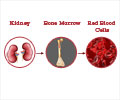High-dose erythropoietin (EPO; a hormone) administered within 42 hours of birth to preterm infants was associated with a reduced risk of brain injury, as indicated by magnetic resonance imaging (MRI).

Russia Ha-Vinh Leuchter, M.D., of the University Hospital of Geneva, Switzerland, and colleagues conducted a study in which 495 infants (born from 26 weeks to 31 weeks and 6 days of gestation) were randomly assigned to receive recombinant human erythropoietin (n=256) or placebo (n=239) intravenously before 3 hours, at 12 to18 hours, and at 36 to 42 hours after birth. In a nonrandomized subset of 165 of the 495 infants (n=77 erythropoietin; n=88 placebo), brain abnormalities were evaluated on magnetic resonance imaging (MRI) acquired at term-equivalent age.
The researchers found that at term-equivalent age, compared with untreated controls, fewer infants treated with recombinant human erythropoietin had abnormal scores for white matter injury (22 percent vs 36 percent); white matter signal intensity (3 percent vs 11 percent); periventricular white matter loss (18 percent vs 33 percent); and gray matter injury (7 percent vs 19 percent).
"These findings require assessment in a randomized trial designed primarily to assess this outcome, as well as investigation of the association with neurodevelopmental outcomes," the authors conclude.
Source-Eurekalert















